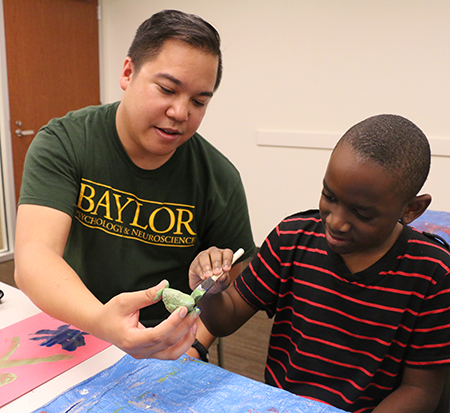Prepared for Service
Allen Mom knew he wanted to pursue a career in service after volunteering for the Special Olympics in high school. He majored in psychology at Baylor, graduating with a BA in 2013. As an undergraduate, he took courses in the School of Education’s Department of Educational Psychology, volunteered at the Baylor Center for Developmental Disabilities (BCDD), and came to the conclusion that a graduate degree in school psychology was ideal.
It was a wise choice. U.S. News ranked school psychology as the No. 1 career in the social sciences for 2015, pegging it at No. 6 on the STEM list and No. 17 overall.
Baylor School of Education was a wise choice, too, backed up by a bigger number — 100. That’s the percentage of Baylor school psychology students who pass the national school psychology Praxis exam.
Mom is now headed to Oregon for his third and final year of the program, a full-time internship in a regional education service center. And he feels well prepared.
“You get to interact with kids right away when you start the Baylor program, and that really attracted me, along with the chance to work at the clinic,” Mom said. His graduate assistantship at the BCDD offered him experience with a variety of evidence-based interventions, both for individuals and groups.
"You get to interact with kids right away when you start the Baylor program, and that really attracted me, along with the chance to work at the clinic."
~ Allen Mom, BA '13
Baylor’s School Psychology program is a nationally approved, 60-hour program leading to the terminal education specialist (EdS) degree. Baylor students complete two full years of coursework, including summers, and 1,500 hours of clinical work, followed by the yearlong internship.
Dr. Alex Beaujean, associate professor of educational psychology and director of the program, said school psychologists are in high demand across the nation, often finding employment in traditional K-12 school settings, but might also work in clinics, health agencies, hospitals or university settings. Recent alumni surveys show most Baylor graduates have landed prestigious jobs or PhD programs.
“Most importantly,” Beaujean said, “our graduates feel prepared to practice psychology in schools. For a practitioner degree, that’s exactly what we want.”
Entering his internship, Allen Mom said that, throughout his time in the EdS program, he benefited from the strong research emphasis in the department. “Baylor professors do a lot of research,” he said. “I have helped author articles and presented at several conferences. I have learned to apply research data to make decisions about field practices.”
That combination of research and practice is optimal, Mom said. “Baylor professors teach the research, but they match the theory with an understanding that things are unpredictable in the field. That way we are not blindsided by reality.”
